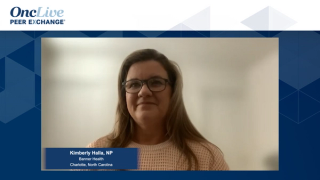
Gynecologic Cancers
Latest News
Video Series

Latest Videos
Shorts
Podcasts
CME Content
More News

Pembrolizumab plus paclitaxel with or without bevacizumab boosted survival in patients with platinum-resistant, recurrent ovarian cancer.

Integrating PRO tools in survivorship care may help oncology nurses address ongoing emotional and physical needs of ovarian cancer survivors.

After undergoing EBRT and brachytherapy at 14, an AYA cancer survivor discusses her experience with a rare vaginal cancer and Turner syndrome.

Subcutaneous pembrolizumab has been approved across all indications, cutting chair and administration times with a median injection time of 2 minutes.

Read an advanced practice nurse's tips for treating patients with endometrial cancer with durvalumab.

Relacorilant’s new drug application for platinum-resistant ovarian cancer has been accepted by the FDA.

Understanding which patients may benefit from CLDN6-targeting immunotherapy and recognizing potential adverse effects is essential for oncology nurses.

The investigational ADC rinatabart sesutecan was given breakthrough therapy designation for use in patients with recurrent/progressive endometrial cancer.

The addition of avutometinib to defactinib showed promising safety and efficacy for patients with low-grade serous ovarian cancer.

In TP53 wild-type advanced or recurrent endometrial cancer, selinexor improved multiple time-to-event outcomes vs placebo.

Oncology nurses can help patients understand this novel mechanism of action and its potential as a treatment option.

The combination of relacorilant and nab-paclitaxel improved survival in platinum-resistant ovarian cancer following a break from platinum-based chemo.

Relacorilant plus nab-paclitaxel improved PFS and showed a trend toward longer OS in platinum-resistant ovarian cancer in ROSELLA.

Seventy-three percent of patients with breast and other solid tumors did not experience ILD recurrence when rechallenged with trastuzumab.

Treatment-related adverse effects were reported in 97.2% of heavily pretreated patients with uterine serous carcinoma taking adavosertib.

Approvals in oncology during April included treatments for breast cancer, colorectal cancer, and more.

Emetogenic chemotherapy regimens and back pain were associated with higher symptom burden in older, vs younger, patients with cancer.

The PRECURSOR intervention appeared feasible/acceptable, suggesting a need for patient-centered conversation in incurable gynecologic cancer treatment.

Oncology nurses can support patients facing financial toxicity by offering guidance on available resources and providing emotional support.

The FDA approved bevacizumab-nwgd across several gastrointestinal, gynecological, brain, and lung cancer types.

Results from the PEACOCC trial warrant further investigation into treatment with pembrolizumab in patients with previously treated CCGC.

The FDA has granted breakthrough device designation to the ACR-368 OncoSignature assay for use in endometrial cancer.

Azenosertib (ZN-c3) demonstrated activity as a single agent in heavily pretreated patients with platinum-resistant, cyclin E1-positive ovarian cancer.

Patients with relapsed ovarian cancer who had germline or somatic BRCA mutations saw greater OS with olaparib, according to data from the LIGHT trial.

Lunresertib plus camonsertib showed promising efficacy in advanced endometrial and platinum-resistant ovarian cancers, with ORRs of 25.9% and 37.5%, respectively.
















































